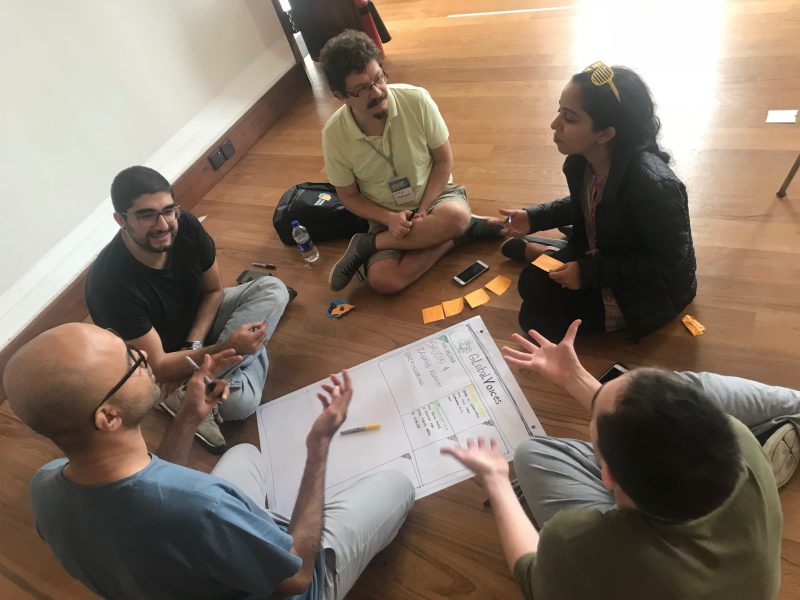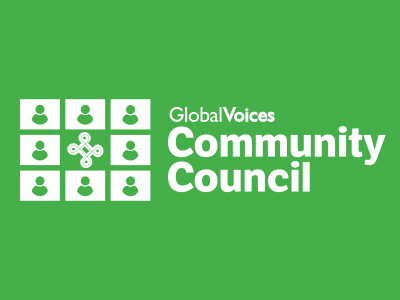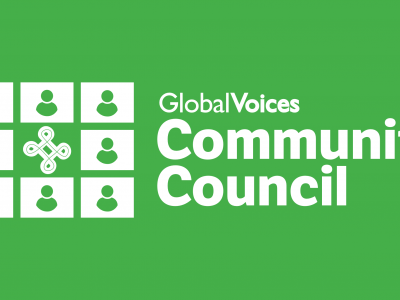
Editors debate newsroom strategies at the 2017 Summit.
The word is out! Global Voices is creating a Community Council to consult on our future.
Why did we do this? What does it mean? And how is it actually going to work?
In recent years, the core team has gathered for week-long retreats where we discuss “big picture” questions about the future of GV—issues like our funding strategy, our governance model and our approach to storytelling. While we’ve found some answers, we’ve realized that we’re not able to determine GV’s future on our own, nor is our board of directors.
This is because GV is, above all, a community. We make the best choices when we’re able to discuss these questions together.
But collaborating as a community isn’t as easy as it used to be—we’ve become much too large for community-wide discussions over email or messaging platforms to be successful.
At our most recent retreat in Mexico City this past March, we decided to build a Council—a group of community members who would commit to considering and debating, in a thoughtful, structured fashion, the key issues that we must confront as we craft our plans for the future.
How will the Council be formed? How will everyone work together?
Our hope is that Global Voices community members—from a wide range of places, perspectives and roles in the community—will participate. Once the Council is formed, we will use a dedicated Google group for general communication and announcements.
We will dedicate two weeks to the discussion of each of the four issues (described below). For each issue, the core team will prepare and share a set of issue papers which Council members will be expected to read. We will use an email list and the Zoom video platform for scheduled discussions and debates.
At the end of the two-week period, we will express our preferences on the issue at hand using the D21 polling platform. D21 offers dynamic voting tools (including “upvoting” and “downvoting” options) and instant visualization of results. We will then start the process again, with the next issue in the roster.
Our process is designed to accommodate many voices and to be as inclusive as possible. Whether the Council is 50, 150 or 1000 people, the input of members will be meaningful, because we’ll all be contributing in the same way—reading, discussing, and reflecting our opinions in polls. We estimate that each Council member will need to dedicate 1-2 hours per week to the process.
What do we mean when we say ‘consultative'?
The Council’s role will be to openly share and discuss issues that are fundamental to Global Voices. The Community Council will not be a decision-making body, but a group that will deliberate on four interlocking questions about governance, editorial focus, the nature of participation, and funding, drawing on GV’s values. The results of these deliberations will inform the decisions we make about our future.
The Council will deliberate on four issues:
- For organization-wide decisions (in contrast to those that affect only one regional or language team) decision-making authority rests with the core team of Global Voices. Should we decentralize decision-making and governance, or centralize it further?
- We cover a broad range of issues in our stories. This allows volunteers to write about a wide variety of topics, but it also creates greater demands for editors. Should we maintain this breath of coverage? Or should we seek to narrow our focus and cover certain issues in greater depth?
- We are a highly inclusive community. This means that we train and mentor relatively inexperienced writers who share our values and wish to participate. This allows us to maintain an extremely diverse community, but it also limits our time and capacity to produce high-quality stories and advocacy campaigns. Should we maintain this level of inclusiveness? Or should we prioritize contributors with specialized skills and expertise in our areas of interest?
- Global Voices is supported mostly by non-governmental grant-making institutions. On principle, we have never accepted direct support from government institutions, and very early moved away from the possibility of advertising revenue. Relying primarily on private foundation funding has become an increasingly difficult model to sustain, given the frequent shifting of strategic priorities from our foundation supporters. Should we change our approach to fundraising so that we are able to support our work to the fullest extent possible?
Note to Lingua translators: The descriptions above also appear in the overview page for the Council. If you've translated that page, all you need to do here is cut and paste ;)
The final decision-making process will be undertaken by the core team and board, using the input of the Council as our roadmap to decide what will best reflect the values and meet the needs of our community.
We are optimistic that this process will serve us better than the casual discussion, email debates and surveys we’ve used in the past, as it offers us a dynamic structure where everyone who is willing to dedicate their time and energy to the Council will give input. We also know it won’t be perfect! But we are hoping that this Community Council will help us reach strong conclusions and build a roadmap for our future.
Sound interesting? Want to commit some time and energy to the future of GV? If you haven’t yet, complete your Community Council application by August 30! And stay tuned for another post next week.


